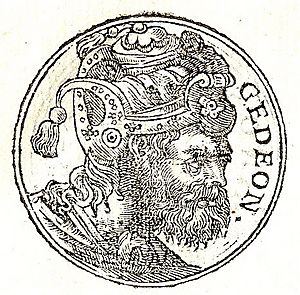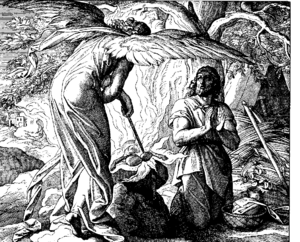Gideon facts for kids
Quick facts for kids
Gideon
|
|
|---|---|
| גִּדְעוֹן | |

Gideon from Promptuarii Iconum Insigniorum
|
|
| Predecessor | Deborah |
| Successor | Abimelech |
| Parent(s) |
|
Gideon (/ˈɡɪdiən/; Hebrew: גִּדְעוֹן, Standard Gīdʿōn Tiberian Gīḏəʿōn) also named Jerubbaal and Jerubbesheth, was a military leader, judge and prophet whose calling and victory over the Midianites are recounted in Judges 6–8 of the Book of Judges in the Hebrew Bible.
Gideon was the son of Joash, from the Abiezrite clan in the tribe of Manasseh and lived in Ephra (Ophrah). As a leader of the Israelites, he won a decisive victory over a Midianite army despite a vast numerical disadvantage, leading a troop of 300 "valiant" men. Archaeologists in southern Israel have found a 3,100-year-old fragment of a jug with five letters written in ink that appear to represent the name Jerubbaal, or Yeruba'al.
Contents
Names
The nineteenth-century Strong's Concordance derives the name "Jerubbaal" from "Baal will contend", in accordance with the folk etymology, given in Judges 6:32. According to biblical scholar Lester Grabbe (2007), "[Judges] 6.32 gives a nonsensical etymology of his name; it means something like 'Let Baal be great.'"
Likewise, where Strong gave the meaning "hewer" to the name Gideon, Biblical scholar Simon John DeVries (1975) suggests the etymology "driver".
The "besheth" part of the name "Jerubbesheth" (2 Samuel 11:21) means "shame". This a pious editorialization of "Baal", as is also found in the names of Saul's son Ish-bosheth and grandson Mephibosheth.
Biblical narrative

As is the pattern throughout the Book of Judges, the Israelites again turned away from Yahweh after 40 years of peace brought by Deborah's victory over Canaan; as punishment, the Midianites, Amalekites and other Bedouin peoples harried Israel for seven years.
Calling
God chose Gideon, a young man from the tribe of Manasseh, to free the people of Israel and to condemn their idolatry. The Angel of the Lord, or "the Lord’s angelic messenger" came "in the character ... of a traveller who sat down in the shade [of the terebinth tree] to enjoy a little refreshment and repose" and entered into conversation with Gideon. The narrative has echoes of the meeting between Abraham and the visitors who came to him in the terebinths of Mamre and promised Abraham and Sarah, in their old age, that they would have a son (Genesis 18:1–15). The angel greeted Gideon: "The Lord is with you, you mighty man of valor!"
Gideon requested proof of God's will by three miracles: firstly a sign from the angel, in which the angel appeared to Gideon and caused fire to shoot up out of a rock, and then two signs involving a fleece, performed on consecutive nights and the exact opposite of each other. First Gideon woke up to his fleece covered in dew, but the surrounding ground dry; then the next morning, his fleece was dry but the surrounding ground covered in dew.
On God's instruction, Gideon destroyed the town's altar to Baal and the symbol of the goddess Asherah beside it, receiving the byname of Jerubbaal from his father:
Therefore on that day he (Joash) called him Jerubbaal, saying, Let Baal plead against him, because he hath thrown down his altar.
Gathering an army
Gideon then sent out messengers to gather men from the tribes of Asher, Zebulun, and Naphtali, as well as his own tribe of Manasseh, in order to meet an armed force of Midian and Amalek that had crossed the Jordan River. Gideon's force encamped at the Well of Harod in the Valley of Jezreel, while the Midianites camped nearby at Givat HaMoreh.
God informed Gideon that the men he had gathered were too many: with so many men, the Israelites might claim the victory as their own, rather than crediting God. God first instructed Gideon to send home those men who were afraid. Gideon invited any man who wanted to leave, to do so; 22,000 men returned home and 10,000 remained. God then told Gideon that this number was still too many, and instructed Gideon to bring the men to the water to drink. God commanded to send home those who had bowed down to drink, as well as those who drank directly from the water "like a dog". Only 300 men, who had cupped the water with their hands to drink it, were allowed to remain.
Night attack
During the night, God instructed Gideon to approach the Midianite camp. There, Gideon overheard a Midianite man tell a friend of a dream in which "a loaf of barley bread tumbled into the camp of Midian", causing their tent or camp to collapse. This was interpreted as meaning that God had given the Midianites over to Gideon. Gideon returned to the Israelite camp and gave each of his men a shofar and a clay jar with a torch hidden inside. Divided into three companies, Gideon and his 300 men marched on the enemy camp. He instructed them to blow the trumpet, give a battle cry and light torches, simulating an attack by a large force. As they did so, the Midianite army fled.
Gideon sent messengers ahead into Israel calling for the Ephraimites to pursue the retreating Midianites and two of their leaders, Oreb and Zeeb. Gideon and the three hundred pursued Zebah and Zalmunna, the two Midianite kings. When he had asked for provisions in his pursuit, the men of Succoth and Peniel refused and taunted Gideon. After capturing the two kings, Gideon punished the men of Succoth, and pulled down the tower of Peniel killing all the men there. Gideon invited his eldest son, Jether, to slay Zebah and Zalmunna, but being still young at the time, he did not have the confidence to carry out his father's request, so Zebah and Zalmunna called on Gideon to perform the deed himself. Gideon then killed Zebah and Zalmunna as justice for the death of his brothers (Judges 8:19–21). The place where Gideon slew Oreb after the defeat of the Midianites was called the Rock of Oreb. It was probably the place now called Orbo, on the east of Jordan, near Bethshean. Zeeb was killed at "the wine press of Zeeb".
Subsequent events
The Israelites invited Gideon to become their king and to found a dynasty, but he refused, telling them that only God was their ruler.
Gideon went on to make an ephod out of the gold won in battle. This action eventually caused the whole of Israel to turn away from God yet again and the ruin of Gideon and his family. Gideon had 70 sons from the many women he took as wives. He also had a Shechemite concubine who bore him a son whom he named Abimelech, which means "my father is king".
There was peace in Israel for 40 years during the life of Gideon. As soon as Gideon died of old age, the Israelites again turned to worship the false god Baal Berith and ignored the family of Gideon (Judges 8:33). Gideon was succeeded for a brief time as ruler of Shechem by his son Abimelech.
Textual history
In the early twentieth century, the text of Judges 6–8 was regarded by the "critical school" as a composite narrative, combining Jahwist, Elohist and Deuteronomic sources, with further interpolations and editorial comments of the Second Temple period. According to this approach, the D source or (D) material has an overwhelming presence in Judges 6–8. The earlier source material used is present. However, the message and theological view has the style of the Deuteronomistic school of Authors. The core (Jahwist) narrative consists of Gideon wishing to avenge the death of his brothers, gathering 300 men of his own clan and pursuing the Midianite chiefs Zebah and Zalmunna, slaying them and consecrating an idol (ephod) made from the spoils of war, which makes his city of Ophrah the seat of an oracle and giving Gideon himself the status of a rich chief with a large harem (Judges 8:4–10a, 11–21, 24–27a, 29–32).
However, other scholars see the story as a single narrative, whose author made allusions to various Pentateuchal passages that he was familiar with. The story also contains consistent thematic elements which suggest a unified composition.
Emil G. Hirsch alleged a historical nucleus in the narrative, reflecting the struggle of the tribe of Manasseh with hostile Bedouins across the Jordan, along with "reminiscences of tribal jealousies on the part of Ephraim" in the early period of Hebrew settlement, later conflated with the religious context of connecting Yahweh with the shrine at Ophrah.
G. A. Cooke, writing in the Cambridge Bible for Schools and Colleges notes the discontinuity between Ephraimite anger towards Gideon shown in Judges 8:1–3 and the proposition of kingship over [all] Israel, and therefore concludes that "these verses appear to come from a [secondary] source".
According to Yairah Amit, Mark S. Smith, and Simon John De Vries, the use of both names "Gideon" and "Jerubbaal" reflects two originally independent sets of stories combined by an editor who wishes them to be seen as referring to a single character. The name Jerubbaal given to Gideon is originally a theophoric name meaning "Baal strives", but it was later given the interpretation of "let Baal strive against him" in order to avoid conflict with the more rigorous development of the religion of Yahweh in later centuries.
Archaeological evidence
A five-letter inscription appearing to represent the name Jerubbaal (another name used in the Hebrew Bible for Gideon) was discovered on a 3100-year old fragment of a jug in Israel. According to Smithsonian Magazine, "the artifact's age lines up with the time period depicted in the Book of Judges."
See also
 In Spanish: Gedeón para niños
In Spanish: Gedeón para niños
- Gideon (name)
- Gideon, 1961 play
- Gideons International, an evangelical Christian association whose primary activity is distributing free Bibles to hotels and motels
- Talut, analogous Quranic figure
- Gideon the Ninth and the Locked Tomb Series by Tamsyn Miur


